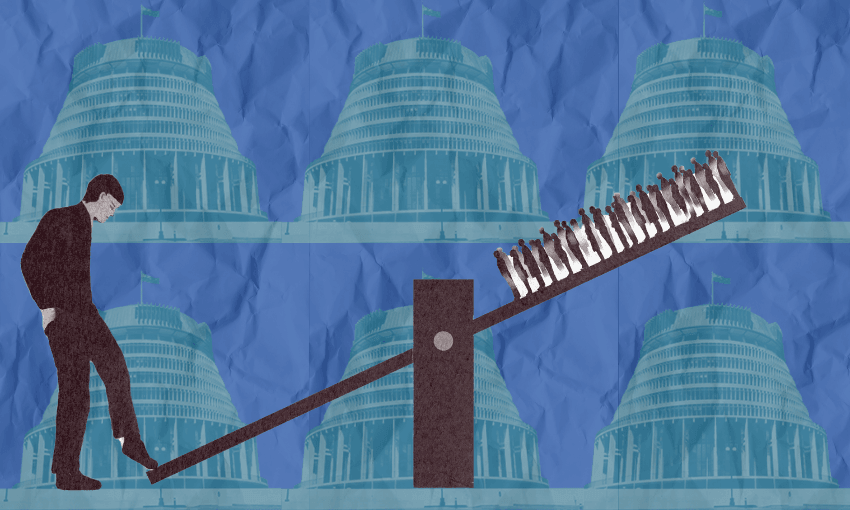From real-terms minimum wage cuts to watering down health and safety, the government is subtly chipping away at pay, conditions and many of the other things that make work life-giving, writes Max Rashbrooke.
Frogs, it turns out, do notice when they’re being boiled. For years the favourite metaphor for people’s insensibility to slow change has been the amphibian that, as the temperature increases imperceptibly, fails to clock that it’s being cooked. Recent research, however, has shown that frogs do in fact jump out of an increasingly hot pot.
So a new metaphor will be needed for what this government is doing to workers’ rights, as it deploys a strategy that is unmistakably based on incremental attacks. Eschewing a full-blown confrontation with labour, the government is subtly chipping away at pay, conditions and many of the other things that make work life-giving. And because no one policy in isolation is world-changing, few people have understood the full extent of the rollback. Here, then, is the long list of the coalition’s anti-worker policies, whether already implemented or in the works.
Implementing real-terms minimum wage cuts
Last year, the minimum wage went up 2% when inflation was 4%. This year, it increased 1.5% when inflation was 2.5%. Minimum-wage workers’ pay packets, in short, buy significantly less than they did in 2023, something economists call a real-terms (that is, inflation-adjusted) pay cut. The Council of Trade Unions calculates that a full-time minimum wage worker is cumulatively $2,438 worse off (again, in real terms).
Removing the living wage in government
Finance minister Nicola Willis wants to remove the requirement that government contractors have to pay the living wage. This is likely to mean that, over time, parliament’s cleaners, caterers and security guards drop from the living wage ($28.95 an hour) to the minimum wage ($23.50), a pay cut of nearly one-fifth.
Repealing Fair Pay Agreements
One of the government’s first moves was to repeal the Fair Pay Agreements Act 2022, which would have established industry minimum standards across low-paid industries. This would particularly have helped workers just above the minimum wage, who don’t directly benefit from its increases and who have seen pitifully small salary rises in recent decades.
Extending 90-day trials
Under Labour, only small employers could impose 90-day trials, which allow them to dismiss an employee for no reason within their first three months of work. The government has allowed employers of all sizes to impose the trials, despite detailed research showing they do not increase hiring, even though they do cause terrible instability for new staff.
Removing union protections for new workers
The government wants to remove the rule that for the first month in a new job, an employee’s pay and conditions must be as good as those in their workplace’s collective agreement (where one exists). This rule gives new staff time to settle, a taste of the terms and conditions negotiated by the union, and protection against being pushed into an inferior individual agreement on day one. Removing this protection will also make it easier to impose 90-day trials on new staff (as above).
Reducing workers’ redress
Even when employees win personal grievance cases, they will no longer be able to get reinstated, or be compensated for hurt and humiliation, if they have “contributed to the issue” in any way – no matter how minor. This, unionists argue, will encourage employers to “go on fishing expeditions, trawling for any tiny errors a worker has made in their job or their application for justice”.
Enabling questionable payouts
A select committee is considering an Act Party member’s bill that would let employers offer employees cash in return for the latter agreeing that their employment is terminated. The offers could be made even when there is no evidence of an employment relationship problem, but where – in the bill’s vague stipulation – “the demands of the business mean that it is imperative to dismiss the employee”. The offers would be “off the record”, meaning that if bullying behaviour occurred during negotiations, the employee could not cite it in a future personal grievance. Staff often feel vulnerable, moreover, and experience fear and stigma about being fired. In practice, then, employers would feel emboldened to “giv[e] the employee an ultimatum – accept what is being offered or be fired”, says employment lawyer Susan Hornsby-Geluk. The bill “would create an unbridled ability for an employer to present an employee with a fait accompli, under the cloak of ‘legal privilege’”, she argues. “This is likely to result in unjust outcomes for the most vulnerable.”
Limiting unjustified dismissal claims
The government plans to prevent employees earning over $180,000 from raising an unjustified dismissal claim. Cry me a river, some might say – but why should, for instance, a senior manager on $181,000 not be able to take a claim if they have been sacked for no reason? There are also many reasons to think the change will be “gamed”.
Limiting contractors’ rights
The government plans to prevent employees incorrectly classified as contractors from contesting that status in court. New Zealand courts have repeatedly found in favour of four Uber drivers who argue that, whatever their written agreement says, they are effectively employed by the ridesharing firm and should have all the protections of employees. The government wants to remove these workers’ ability to pursue their rights in court, arguing that if they have signed an agreement saying they are contractors, that’s all that matters. This flies in the face of standard New Zealand legal practice, which rightly allows the courts to effectively set aside written agreements if the actual working relationship is otherwise (and thus protect employees from the consequences of being bullied into signing something inaccurate).
Cutting public sector jobs
While the final scale of the government’s public-sector job cuts is not yet known, it is clearly in the thousands. Staff could have been redeployed to new priorities, or asked to carefully find efficiencies. Instead a hasty and blunt process has seen thousands of often highly skilled workers made redundant.
Disestablishing the pay equity taskforce
The government has disestablished the six-person pay equity taskforce, arguing – in essence – that public bodies have got so good at settling pay equity claims that they no longer need centralised support. This argument got short shrift from people like Nurses Organisation chief executive Paul Goulter, who said the move represented “a huge loss” of knowledge and skills that were “of huge benefit to both employers and the unions representing their employees in sorting pay equity issues”.
Watering down health and safety
The health and safety minister, Brooke van Velden, has announced that small businesses won’t have to manage things like psychosocial or ergonomic risk. But mental health and musculoskeletal disorders are the two main causes of workplace harm, and smaller firms have higher rates of injuries than larger ones. Meanwhile van Velden has talked vaguely of a “first principles” review of the 2015 Health and Safety at Work Act, despite everyone from Business New Zealand on down pointing out that this would be a bad idea.
Implementing pay reductions for partial strikes
The government has introduced a bill that would allow employers to reduce workers’ pay by at least 10% when they carry out “partial” strikes, such as refusing to perform all their duties. Hornsby-Geluk argues that this “does not seem unreasonable”, but unionists believe that, given most employees have very limited ability to win better terms and conditions, partial strikes are a valid form of action and should not be penalised.


